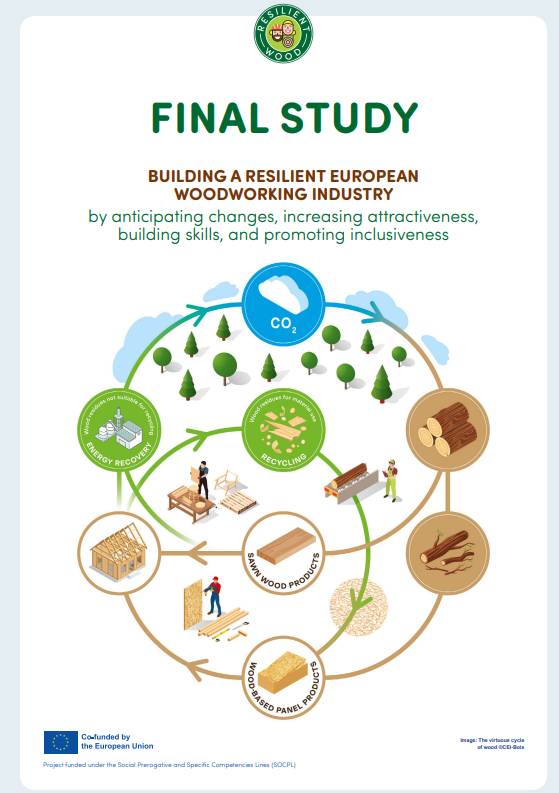
THE RESILIENTWOOD PROJECT PARTNERS PUT FORWARD A SERIES OF RECOMMENDATIONS TO BUILD A STRONG EUROPEAN WOODWORKING INDUSTRY
BRUSSELS, 4 September 2024 – Today, the project partners held their final conference. Employment in the wood industry is vital not only for economic prosperity and social stability but also for advancing environmental sustainability and innovation. The sector’s ability to provide jobs across various skill levels and its role in sustainable resource management make it a cornerstone of the bioeconomy. Over fifty participants travelled to Brussels to attend the final conference and learn more about innovation, inclusion, mobility for apprentices and attracting young people to the wood industry. The attendants also had the opportunity to discover the results of the project’s final study, as well as the partners’ policy recommendations.
Innovation, inclusiveness, mobility and youth
Innovation, inclusiveness, sound working conditions and mobility are interlinked factors that contribute to reshaping the woodworking industry. Innovation is driving technological and sustainable advancements, inclusiveness is creating a more diverse and equitable workforce, while mobility is providing career flexibility and growth opportunities. By focusing on these areas, the woodworking industry is not only staying competitive and innovative but also becoming a more dynamic and attractive field for current and future generations. During the course of the RESILIENTWOOD project, social partners and training providers had the opportunity to meet at various occasions, to organise thematic workshops, to carry out company visits and to engage in numerous exchanges with experts. For this final event, they wanted to look back at the various themes addressed during the project through the testimonies of:
- Anna Barbieri (European Commission Directorate-General for Employment, Social Affairs and Inclusion), who presented the EU Alliance for Apprenticeships as well as the mobility possibilities for apprentices offered by the Erasmus+ programme, as apprenticeships can bring a response to labour and skills shortages.
- Melanie Kaindl & Gennaro Azzollini (Microtec), who gave a sneak peek at sawmill of the future. A good example of how companies that are often perceived as old fashioned are actually (very) modern and resolutely future oriented.
- Simona Corrado (Filca-Cisl), who explained how to build a more inclusive workplace and gave examples of policies already in place in Europe and Italy.
- Maarten Leyts (Trendwolves), who looked at what influences the young generation and the role the social media can play in delivering the messages of the wood industries to the future workers generations.
Final study
The woodworking industry is continuously embracing new technologies such as CNC (Computer Numerical Control) machines, robotics, AI, etc. enhancing precision, efficiency, and the ability to create complex designs while innovation is driving the development of eco-friendly products and processes. The adoption of digital tools for design is revolutionising how wood products are conceptualised and manufactured. Jean-Denis Lanvin (FCBA) presented the final study of the project and provided an overview of the latest developments in the woodworking industries in Europe. The study is a useful tool to stimulate social partners’ discussions on the challenges of adapting the industry after the Covid-19 pandemic. It contains a series of chapters focussing on the adaptation and prospects in times of crisis, the women representation in the industry, the expected technological changes and adaptation needs as well as the role of VET and student mobility in Belgium, Italy, Sweden, France and Croatia. A separate chapter also deals with those topics for the European sawmill sector at large.
Recommendations and guidelines
A series of recommendations and guidelines designed to anticipate changes, increase attractiveness, build skills and inclusiveness in the European woodworking industries forms the final element of this two-year project. The woodworking industry is increasingly recognising the importance of a diverse workforce. While there is room to further increase the share of underrepresented groups among the woodworking industries workforce, efforts to include more women and individuals from various backgrounds are helping to address labour shortages and bring new perspectives to the industry. Inclusiveness in the industry is supported by initiatives to provide permanent training and education, ensuring that everyone has access to opportunities in woodworking, from entry-level positions to leadership roles.
During the concluding panel discussion, the partners also stressed the importance of life-long learning, social dialogue and social partners’ involvement, as well as the need to attract and retain a skilled workforce. Above all, the partners recognise that if the woodworking industries are to contribute to a more sustainable and resilient economy, a reliable and affordable sustainable raw material availability is a sine qua non. The study and the recommendations can be downloaded from the project website: www.cei-bois.org/resilientwood.
Related Posts
Contact
EUROPEAN ORGANISATION
OF THE SAWMILL INDUSTRY AISBL
Rue Montoyer 24/box 20
BE-1000 Brussels
Tel.: +32 2 287 08 68
Email: info@eos-oes.eu


